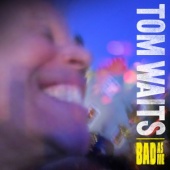
Tom Waits
Bad as Me
(Anti-; 2011)
By Brent Ables | 11 November 2011
So, hey: Tom Waits is 61 years old. He is now entering his fifth decade of recording—which is important, although maybe not for obvious reasons. Without a doubt, Waits’s longevity and endurance in an industry which doesn’t necessarily encourage such qualities is admirable. As is the fact that he hasn’t really softened up or mellowed down his music in all that time. Because of these accomplishments, the very existence of a new Tom Waits record, especially one as purposeful and concise as Bad as Me, his seventeenth album, is cause for celebration. But I find these considerations extraneous to a judgment of the album itself, and here is where I differ from those critics who have, nobly enough, tried to honor Waits’s career by lauding as “essential” and even “genius” a record that is neither of these things. It’s a pretty good album, but I think its intentions are humbler than that.
Tom Waits knows he’s getting old. He knows he’s going to die. He thinks about it. A lot. It’s all over this album. But, as you might expect from such a Bad dude, he’s pretty nonchalant about it: “When I’m gone / Roll my vertebrae out like dice / Let my home be a skull for the mice.” He knows this shit happens, and the world goes on, and he’s not breaking a sweat about it. In fact, he’s doing one better: he’s giving the finger to the future—as if anyone expected any differently.
That’s what Bad as Me sounds like. It sounds like a Tom Waits record, sure; it sounds not like that of an aging artist trying to solidify his place in the canon with one final work of innovative genius, but that of a great musician blowing off the canon and just kind of doing what he does best. Bad As Me is the well-worn Waits aesthetic concretized, even ossified: an expert encapsulation of all the compositional peculiarities and makeshift production quirks that have come to define his signature style over the decades. As such, it’s an enjoyable album for those who have known, and loved, that style, and probably will be even more so for those to whom Waits is unfamiliar.
What Bad as Me isn’t, however, is a step into the musical unknown—though listening to Waits’s lyrics, one might be tempted to think otherwise. Nearly every song on this album contains some reference to Waits’s association with the fringe, the outré, or simply the new. The album opens with a travelogue, “Chicago,” wherein the narrator wonders, “Maybe things will be better in Chicago / To leave all we’ve ever known / For a place we’ve never seen.” This basic longing for the unseen shows up again and again on the album: Waits wants to go get lost on “Get Lost,” he glorifies the life of the nomadic troubadour on “Pay Me,” and “Face to the Highway” is just one big extended metaphysical argument for the need to travel (“The ocean wants a sailor / The gun wants a hand / The money wants a spender / And the road wants a man”).
Even when he isn’t singing about spatial distance, Waits makes a point of distancing himself from your typical “Good” Everyperson: think of “Bad as Me” as the scowling answer to those “Raised Right Men”; there’s “Everybody Talking at the Same Time,” which bemoans the idle chatter of the masses. A little more endearing is Waits’s plea for a strange romantic thrill on “Kiss Me,” where he implores his long-time partner to kiss him “like a stranger once again.” And through all this, you begin to detect a subtle anxiety—a longing for escape and change—that belies the toughness and grit so conspicuously foregrounded on the album.
From what, then, could Tom Waits long to escape? Though he seems ever so comfortable in his own rebel persona, he curiously insists on that persona, emphasizing where no emphasis is needed. Perhaps Waits does sense at some level that his musical evolution has effectively stagnated, and there’s something in him struggling against that fact: a subliminal fear that disguises itself as the bravado of an outlaw. Or maybe it digs deeper than that, is in his surprisingly vulnerable concern with his mortality. The resistance to entropy takes many forms, but they all have in common the struggle for novelty, for the creative or transgressive or creatively transgressive. Is it this resistance stirring Waits to continue? To continue making his raucous, even hellish, party music though his sound was defined and perhaps made immutable long ago? You’d be forgiven for missing it altogether.
I don’t mean to suggest that Bad as Me is somehow a dour or troubling album, or that it’s not damn good fun listening to Tom Waits spit and growl and mewl out these tracks with the same aplomb we’ve come to expect from him. The “brawlers” here, like “Bad as Me,” “Satisfied,” and “Get Lost,” are just as dirty and bloody-knuckled as ever; the bawlers, like “Pay Me” and “Last Leaf,” just as weepy and drunkenly endearing. Also: a compelling undercurrent of political outrage which culminates in “Hell Broke Luce,” an anti-war screed whose macabre and bleakly humorous death-stomp, complete with machine gun percussion, is perhaps the most visceral, and therefore the most “essential,” thing on this album. No, the record has more than its share of enjoyable moments, and more than its share of predictable “genius,” but a seemingly new dread, a latent, sometimes crippling anxiety, lends the album a certain emotional edge, a hint of vulnerability, that is normally absent in the work of this Baddest of singer-songwriters. Just don’t tell him that.





